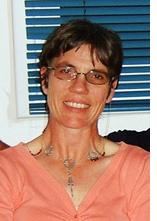| |
|

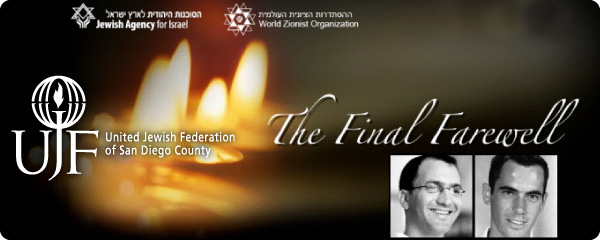


FRIDAY, JULY 18 Temple Solel Shabbat at Beach


SUNDAY, JULY 27Israeli artist Shosh Ernst one-woman show in San Diego
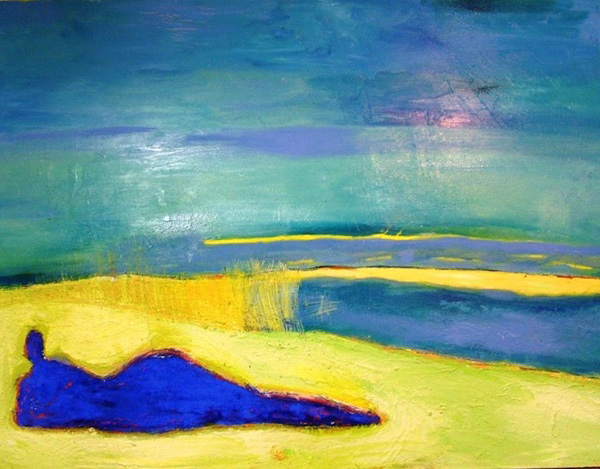

SATURDAY, AUGUST 2 Temple Emanu-El Joshua Nelson Concert


___________________________________________________________________
MON., SEPT. 29-THURS., OCT. 9


JERUSALEM DIARIES
The heroes of Israel, from the Exodus hunger-strikers to Goldwasser and Regev
By Judy Lash Balint
 JERUSALEM—As two shiny black coffins on Wednesday passed from Lebanon to Israel, and murderer Samir Kuntar appeared in his "commando" uniform at a festive welcoming ceremony in Lebanon it was hard to accommodate the welter of emotions that flowed during one of Israel's darkest days in recent memory. JERUSALEM—As two shiny black coffins on Wednesday passed from Lebanon to Israel, and murderer Samir Kuntar appeared in his "commando" uniform at a festive welcoming ceremony in Lebanon it was hard to accommodate the welter of emotions that flowed during one of Israel's darkest days in recent memory.
But, as with every traumatic event here, there are points of such stark illuminating light that always occur among the simple people, not the so-called "leaders," which enable us to retain our pride and faith in the ultimate destiny of the country.
Eldad Regev, 28, and Udi Goldwasser , 31, were both "miluimnikim" — reservists who spend around a month every year serving with their army units . When they were abducted they were fulfilling their reservist obligations. Yesterday, as the coffins containing their remains were returned, the members of Eldad and Udi's reserve unit were waiting at a nearby army base. Shlomi, a soft-spoken member of the unit in his mid-thirties, choked back tears as he told reporters that all the men would continue to serve, "with the spirit of Udi and Eldad accompanying us all the way." While accusing Hezbollah of "playing with us" by withholding information about Regev and Goldwasser for two years even till the last moments before the exchange, Shlomi acknowledged that the tears he and his friends could now openly shed would be not only tears of sadness but "tears of memory."
At the moment that the coffins were removed from the black vans on the Lebanese side, a rabbi at the Regev home in Kiryat Motzkin quietly lit two memorial candles in the stairwell of the apartment building underneath pictures of the two kidnapped soldiers. Neighbors and friends sobbed as reality finally hit home.
Sadly, halachic input has been sorely lacking from the Israeli debate over the lop-sided exchange—not a word was heard from either of Israel's chief rabbis, Yonah Metzger or Shlomo Amar, causing many of us to ask, once again, just why our tax shekels continue to subsidize the anachronistic institution of the chief rabbinate, who are shunned by the ultra-orthodox world and ignored by secular Israelis.
It was left to prominent Israeli human rights lawyer, Justus Weiner, a fellow of the Jerusalem Center for Public Affairs where I work, to weigh in on the halachic and international law implications of the exchange.
A few hours before the exchange took place, I received an e mail notification about the second yahrzeit ceremonies of Benji Hillman z"tl, son of friends in Raanana, who was killed early on in the war at age 26, just three weeks after his wedding, sent to battle in order to redeem Regev and Goldwasser whom we now know were already dead.
Most years in mid-July, Jews are in the midst of the Three Weeks that lead up to Tisha B'Av, the day that commemorates the series of disasters that befell the Jewish people on and around this date since the destruction of the Temple. This year being a leap year in the Jewish calendar, we're not into that period yet. Still, on the secular calendar, this week marks the 61st anniversary of the date when the Exodus, packed with 4,500 Holocaust survivors aboard, limped into Haifa harbor after having been boarded by British authorities resulting in the death of three passengers. As the British sought to send the Jews back to France, from where they had set sail, the defiant survivors refused to disembark and started a 24-day hunger strike that eventually led to members of the UN Special Committee on Palestine influencing their colleagues in New York to put the partition plan to a vote. That decision, taken in November 1947, of course, led to the creation of the state of Israel in May 1948.
In Jerusalem Wednesday night, just hours after we had all witnessed the heart-sickening spectacle at the Lebanese border, a few hundred people gathered to relive the heroism and single-minded Zionism of the Exodus. Yes, it may have been the fictional account –in the form of the 1960 film Exodus starring Paul Newman, but nevertheless, reality seeped in, as it tends to in Jerusalem. In the audience at the auditorium of the Menachem Begin Heritage Center were several passengers from the real Exodus; the daughter of Yossi Harel, the commander of the Exodus who died a few months ago and veteran Jewish journalist, Ruth Gruber, 96, who covered the story in 1947.
We gasped as we saw the exact spot where we were sitting depicted in one scene, and murmured as we recognized familiar spots in Jerusalem in their 1960 state. Otto Preminger had apparently spent 13 weeks filming in Israel using 4,000 extras for the epic three and a half hour movie. The head of MGM came from Los Angeles to present the Israeli film archive with a newly restored version of the film, which was the one screened last night.
Today, Udi and Eldad will be buried in the north at funerals attended by tens of thousands of mourners. They and their dignified families are the heroes of Israel, 2008, along with the 157 Israelis, soldiers and civilians killed in the Second Lebanon War. If only their sacrifice would lead to something as momentous as the founding of the state.





THE JEWISH CITIZEN
Making children smile, aiding world peace
By Donald H. Harrison
  SAN DIEGO—Perhaps I should have taken it as an omen. As we left for Sea World, my son-in-law, Shahar, a frequent visitor to the country of his birth, presented me a cap prominently bearing the name and flag of Israel, which I proudly donned. As we paid for parking at Sea World, a Muslim ticket taker, identifiable by the scarf she wore as a head covering, warmly smiled at the five of us in the car and wished us a wonderful day! She may not have seen my cap, or maybe she did; I shall never know. But the two facts in juxtaposition put a smile on my face. It could have been a scene, I thought, right out of Sesame Street, the television program which is Sea World’s newest marketing partner. SAN DIEGO—Perhaps I should have taken it as an omen. As we left for Sea World, my son-in-law, Shahar, a frequent visitor to the country of his birth, presented me a cap prominently bearing the name and flag of Israel, which I proudly donned. As we paid for parking at Sea World, a Muslim ticket taker, identifiable by the scarf she wore as a head covering, warmly smiled at the five of us in the car and wished us a wonderful day! She may not have seen my cap, or maybe she did; I shall never know. But the two facts in juxtaposition put a smile on my face. It could have been a scene, I thought, right out of Sesame Street, the television program which is Sea World’s newest marketing partner.
I had been reading on the Internet about all the work that the creators of the non-profit television show Sesame Street have been doing around the world to teach children about tolerance, kindness, and good health practices. I learned that Gary Knell, the chief executive officer of Sesame Workshop, once served as editorial page editor of the UCLA Daily Bruin, one of the positions I earlier had held on the same newspaper. More importantly, I learned that Sesame Street, in various international versions, has introduced a character with AIDS in South Africa; a girl with very high educational aspirations in Egypt; and a mixed assemblage of Arabs and Jews (who get along, and smile, and no doubt wish each other wonderful days) for Israel, Jordan and the Palestinian Authority.
The South African child with AIDS has friends who assure her they are not afraid to play with her because they know they can’t get AIDS just by being her friend; the girl in Egypt announces her intention to stay in school, to keep studying, and to be a great success—perhaps as a doctor, or as an astronaut, or as a teacher, she hasn’t decided yet. But whatever it is, she will be wonderful at it. Contrast her attitude to the 60 percent illiteracy rate for women that Sesame Street confronted in Egypt when the show started there.
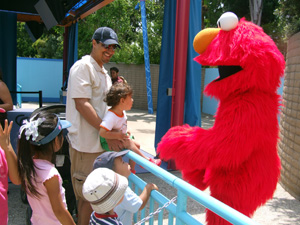 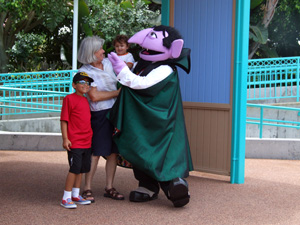
Our second grandson, Sky, 16 months old, doesn’t say many words, but one which he pronounces with clarity and with reverence is “Elmo,” which is the name of the red, furry character with a high voice who loves to be tickled. Of course, Sea World is best known for Shamu, its leaping Orca whale, but try the recognition test with any pre-schooler: hold up a picture of Elmo in one hand and of Shamu in the other. Which image do you think causes the greatest amount of recognition?
At Sea World’s “Sesame Street Bay-of-Play,” a costumed-character Elmo cavorts on a long bridge leading to the deck of a sailing ship with such instantly recognizable Sesame Street friends as Bert, Ernie, Cookie Monster, and Zoe. The upbeat songs they lip synch put children—and their parents and grandparents—in a mood for fun, hugs, learning and openness. For San Diegans, going to Sea World is a way of thinking globally and acting locally; whatever revenues Sesame Street earns from its toy sales and co-marketing projects such as this one, helps to finance works like those seen on PBS in the United States and in educational programming in countries around the world. Make my grandchildren smile, and help world peace? Now that’s a bargain!
Our eldest grandson, Shor, is now 7, and while he has an appreciation for Sesame Street friends like Elmo and others from the days when he was “just a kid,” now he’s a bit too old for all that—although not so “old” that he didn’t happily pose with “The Count” and our family members when a walk-around-character came by. So, it was arranged that Shor and his grandma, Nancy, would check out some of Sea World’s regular shows, featuring dolphins, sea lions , otters, and of course whales, while Shahar, Sky and I spent most of our day at the Bay of Play. Cell phones make it easy for families to pursue separate activities, even when sharing an amusement park with tens of thousands of other people.
 
 Some of the highlights of the day for Sky (and okay, daddy, and grandpa too) included meeting “Elmo” face to face, riding in a flying fish that went up and down as it circumnavigated a large pole, and running through dancing waters that shot skyward from the ground. Sky was delighted with his first exposure to this kind of attraction and kept coming back to get wetter and wetter. Luckily, extra clothes had been packed away for him! Some of the highlights of the day for Sky (and okay, daddy, and grandpa too) included meeting “Elmo” face to face, riding in a flying fish that went up and down as it circumnavigated a large pole, and running through dancing waters that shot skyward from the ground. Sky was delighted with his first exposure to this kind of attraction and kept coming back to get wetter and wetter. Luckily, extra clothes had been packed away for him!
Another highlight was a “4-D Movie” in which all the Sesame Street characters urged us to use our “imaginations” and then, with the help of 3-D visual effects, seats that vibrated, and some water spray emanating from the backs of the chairs in front of us, assured us of participation in the fantasies of such Sesame Street characters as “Oscar the Grouch.”
Nancy, I learned, apparently has her own fantasy. We walked together past a fun house mirror which has the effect of slimming down your reflection considerably. “Look!” she said, “there’s the guy I married 40 years ago!”



ARTS IN REVIEW
Nathan Detroit and friends trodding the boards at Moonlight Amphitheatre in Vista
By Carol Davis
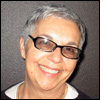 VISTA, California—One of my all time favorite musicals is Guys and Dolls. Based on Damon Runyon’s stories of New York showgirls and gamblers and adapted by Frank Loesser (music and lyrics), Jo Swerling and Abe Burrows (book) this fable is by far one of the all-time perfect musical comedy classics. It’s clever, smart, and gruff yet loving, with a language all unto its own known only to those characters shared to us by Runyon and marked indelibly into our collective memories. VISTA, California—One of my all time favorite musicals is Guys and Dolls. Based on Damon Runyon’s stories of New York showgirls and gamblers and adapted by Frank Loesser (music and lyrics), Jo Swerling and Abe Burrows (book) this fable is by far one of the all-time perfect musical comedy classics. It’s clever, smart, and gruff yet loving, with a language all unto its own known only to those characters shared to us by Runyon and marked indelibly into our collective memories.
As a side note, Burrows is listed in the annals of Jewish American Writers, American Dramatists and the Hollywood Blacklist, more accurately the entertainment industry blacklist. These entertainers were denied employment because of their political beliefs or associations, real or suspected. (Sounds like the antics of our current Justice Department). Burrows was not charged or restricted from pursuing his career, but remained a ‘person of interest’ because of some of his associates.
It was popular belief in those days that his contributions to Guys and Dolls was what prevented the Pulitzer Committee from awarding it the coveted prize even though it won everything else. (Opening Night on Broadway, 1943-1964 by Steven Suskin). So much for guilt by association!
The musical is based on The Idyll Of Miss Sarah Brown, a short story by Runyon. It was first produced on Broadway at the 46th Street Theatre where it opened on November 24, 1950. Initially, it ran for over one thousand performances and won five Tony Awards including Best Musical. In his review of Guys and Dolls, John Chapman of The Daily News said, “The big trouble with Guys and Dolls is that a performance of it lasts only one evening, when it ought to last about a week”. …. “For here is New York’s own musical comedy….”
For yours truly, I’ll see it any time I can; it’s that much fun.You have characters named Nathan Detroit (Lance Arthur Smith), Nicely-Nicely Johnson (James Gruessing, Jr.), Sky Masterson (David S. Humphrey), Benny Southstreet (David Beaver), Harry the Horse (Brett Daniels) and Big Julie (Michael Hill) to name a few of the street characters (the guys). Added to the mix is Miss Sarah Brown (Beth Obregon) with her band of do gooders from ‘Save A Soul Mission’ marching through the streets of NYC looking to reform, well, the likes of Sky Masterson. Bring in Miss Adelaide (Tracy Lore) lead singer at the Hot Box nightclub and engaged to Nathan Detroit for 14 years, constantly ‘with the wheezes and the sneezes’ because of Detroit’s failure to marry her, and you have a clash of the titans a la Broadway fable style.
It is now playing at the Moonlight Amphitheatre in Vista and is the first of the three shows to be mounted in Vista by Moonlight Stage Productions. It has plusses written all over it. Directed and choreographed by John Vaughn and starring David S. Humphrey as Sky Masterson and Beth Obregon as ‘the Mission Doll,' Lance Arthur Smith as Nathan and Tracy Lore as Miss Adelaide, this talented foursome is just the top layer of a well- rounded cast and a well executed production.
Humphrey, no stranger to musicals (he was on the national tour of Forever Plaid and has been in Secret Garden, Into The Woods, South Pacific and 1776, just to mention a few of his local credits) is the ideal Sky Masterson. He’s tall, handsome and.. has a great voice. His leading lady, Beth Obregon is another plus for Humphrey’s Sky. She has been able to master the very difficult music of the Sarah Brown character, she can act, and there was chemistry.
The same can be said for Lance Arthur Smith’s Nathan Detroit and Tracy Lores Miss Adelaide. In this reviewer’s humble opinion, Miss Adelaide is the most fun to watch, listen to and chuckle over. Everything about her role is delicious and she plays it to the hilt. Honorable mention must go to Ralph Johnson as Arvide Abernathy (Sarah’s grandfather). His rendition of “More I Cannot Wish You” was simply lovely. Kudos to James Gruessing, Jr. David Beaver, Brett Daniels and Sue Boland as General Matilda Cartwright.
I would be remiss if I failed to mention the Moonlight orchestra under the able baton of Kenneth Gammie and their solid rendering of some of the most clever music to come out of Broadway. Credit Christina L. Munich for her lighting design, Chris Luessmann’s sound and Ambra Wakefield’s costumes. This one is a must see. It is outdoors and while blankets are not required, they help. Guys and Dolls will be playing through July 20.
See you at the theatre.


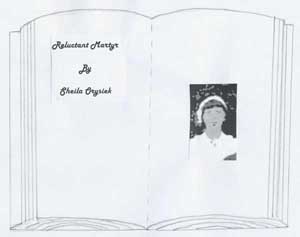 Editor's Note: This is the 17th chapter in our serialization of Reluctant Martyr, a historical novel by our columnist Sheila Orysiek. It is based on the experiences of her aunt. In each Friday-Saturday edition of San Diego Jewish World, we will run another installment of the 21-chapter book until its conclusion. We thank Sheila for granting us first publication rights to her book. Comments to the author are welcome at orysieks@sandiegojewishworld.com Editor's Note: This is the 17th chapter in our serialization of Reluctant Martyr, a historical novel by our columnist Sheila Orysiek. It is based on the experiences of her aunt. In each Friday-Saturday edition of San Diego Jewish World, we will run another installment of the 21-chapter book until its conclusion. We thank Sheila for granting us first publication rights to her book. Comments to the author are welcome at orysieks@sandiegojewishworld.com
Chapters 1 2 3 4 5 6 7 8 9 10 11 12 13 14 15 16 17 18 19 20 21
Reluctant Martyr—Chapter 17
A couple of months later Pearl Harbor was attacked and the United States entered the war. People were frightened but at the same time determined. Young men began to disappear from the city streets as civilians and reappear in uniform; Joel was among the first to leave for England; Irek was already there.
The entire country as well as each individual neighborhood shifted into a wartime mentality. Newsreels in the Girard Avenue Movie Theater now showed film of battles and tanks and bombs. Every evening families gathered around the radio and children were hushed as the news came on. Air raid sirens were heard and there were practice drills. People had to black out all light that came from their houses at night and air raid wardens patrolled the streets of the neighborhood. Bernard was the captain for his area and walked about in the dark, checking each house. Tin cans were flattened and saved for reuse as were cooking fats, rubber and almost any scrap metal. Etah, with the enthusiastic patriotism of a grateful immigrant, used Sarah’s baby carriage to collect scrap metal from around the surrounding streets; she destroyed the carriage as a result of the heavy loads.
When Jahn had been gone for over two years, Hannah put on a brown dress instead of a black one; it did not go unnoticed. A friend of Sharona’s took particular note and one day when Hannah was out of the house, came to call. It was winter and the elderly lady walked carefully through the icy streets to Sharona’s house.
“Please come in Frieda, please,” Sharona said as she opened the door. “Let me have your coat. Do sit down.” The two women sat in the little parlor, holding their teacups and asking after family matters.
“You know, Sharona, I have a son. A very good son.”
“Yes, I know, he’s been very good to you.”
“He is good! But, he’s lonely. It has been hard for him since Ina died four years ago. He had a hard time getting over it. And then, there’s his child, but it’s not the same, he needs a wife.” After a very long pause she continued, “I have seen your Hannah, she’s looking much better. She had on a nice dress the other day! Could it be possible, Sharona, that maybe my son and your daughter could perhaps ... sometime ... get to know each other? I’ve asked him and he wants to, but he is afraid of disturbing Hannah.”
Sharona looked out the window for a moment. She wanted very much for Hannah to begin living again. “I don’t know,” she replied, “I don’t know if she’ll ... I’ll ask her. I’m only afraid she’ll think I’m insulting Jahn’s memory, you know. But I will ask her. It may be time.”
Several days later as Sharona sat on the sofa darning Istvan’s socks and Hannah was writing a letter, Hannah made a comment that she missed some of her friends who had moved away and Sharona thought it a good moment. “Frieda was here several days ago, I forgot to tell you. She is worried about her son. You know his wife, Ina, died four years ago and he is lonely. She likes you, Hannah, and would like you to meet her son. He would like to call you. What do you think?” To her great surprise Hannah did not react angrily or even much at all. In fact, she seemed to nod.
Soon after that, Frieda’s son, Allen, called on the phone and spoke to Hannah. Sharona was in the room and couldn’t help but overhear and she prayed and hoped her daughter would accept this offer of friendship. Hannah did and Allen was invited to come over on Saturday afternoon to meet her for a walk. As simple as that, just two people who had known terrible hurt would take a walk together.
Hannah went shopping and bought a dress to wear, also a hat and a pair of gloves. On Saturday she laid them out on her bed and with her usual care arranged her hair and put on the clothes. Sharona sat on the edge of the bed and watched her, helping with an occasional hairpin or dashing off to her own room to find an appropriate perfume. It filled her heart to see her daughter once again taking an interest in life, reaching for a future.
Hannah, you look very nice,” Sharona said. “It’s good to see you this way again. How do you feel?”
“I feel nothing. Absolutely nothing.”
Istvan let Allen in the front door and he stood in the hall at the bottom of the stairs, his hat in his hand. Sharona was already half way down the steps, with a smile to greet Allen, when Hannah came out of her room and to the top of the stairs. Suddenly the sight of a strange man waiting there in the hall was too much, her composure gave way.
“I can’t!” she cried. “Jahn, oh Jahn! I can’t!” Her very soul was sobbing as she ran back into the bedroom and closed the door. Allen’s face fell; her cries reawakened his grief for his dead wife.
“It’s too soon for her,” he managed to say. Sharona, tears falling from her own eyes tried to make amends, but he left as quickly as he could.
........................................................
As the war went on it absorbed more and more of the country’s energies. Occasionally a letter came from Irek, but the family was never told exactly where he was. When Aunt Nora received a letter from Joel, she ran the two blocks to State Street to share it with the family. The letters were precious, a testimony that he was alive, at least for the moment. Aunt Nora would read and reread them. It wasn’t the words that mattered so much, but the fact that her son’s hands had touched the paper.
The nation waited breathlessly as Normandy was invaded and prayed over every step of the advance through Europe. There was the setback of the Ardennes Forest and finally, after so much travail, the linkup with the Russian Army. But, of course, the war was not over and America’s attention was riveted on the battles in the Pacific. When at last the unconditional surrender of Japan was accepted happiness was tempered only the remembrance of those who had lost their lives.
The people in the neighborhood filled the streets on that day, shouting and laughing with joy. Cars sounded their horns, fire crackers boomed, perfect strangers cried together and Girard Avenue, 40th Street and Fairmount Park were filled with people from one side to the other. The bridge across the Schuylkill River was one mass of humanity; barges were on the river and fireworks sparkled overhead.
After the joy of victory, people began to adjust to peace time. Thousands of soldiers returned home and domestic concerns became important. Because of the war effort industry and the pace of life had accelerated. At this time also a change came about when a truck from the Philadelphia Electric Company arrived in the neighborhood and parked beside the gas lamp near Sharona’s house. Men tore apart the light pole, strung wires and pulled off the glass dome on top. Neighbors stood about and watched as a bulb was screwed into a socket and the glass replaced. Not long after as night fell the electric light came on just like magic, or so it seemed. People wondered, though, what would happen to the little man who used to come every night, no matter what the weather, and light the gas lamp. Modern times had come to State Street.
Since Etah’s daughter, Sarah, lived closeby she was often at her grandmother’s house, much to Hannah’s chagrin. Sharona was cautioned constantly by the family to take care of her health, but when no one was about, she and Sarah played tag; the child had inherited Sharon’s playful imp. Round and round the dining room table they would go, a kitchen towel was used to score on one another. The game would keep on till Sharona sank exhausted on a chair, both she and the child full of laughter. Then Sarah would get her grandmother’s purse from out of the sideboard and watch eagerly as Sharona placed a nickel in her hand for an ice cream cone. With sheer joy the child would skip out of the house to the ice cream shop across the street.
Hannah thought doting on the child was ridiculous and told Sharona so. Though she knew Sarah was not to blame, the sound of the child’s name was an affront. She could see Sharona enjoyed having this grandchild about and that irritated her even more. To Hannah, she was another intruder. She never spoke to Sarah any more than was absolutely necessary and her impatience showed in every word. She was jealous of her mother’s time and affection.
On one cold winter day Sarah brought over her doll, several of her toy pots and pans and her little rolling pin. The five year old and Sharona put on their aprons and rolled pastry dough for Hamentashen pastries. Sharona made it completely authentic for the child and Sarah ended up with a tiny baked pastry which she fed to her doll with studied attention. Then at supper time Etah came over and shared the evening meal as Bernard was working that night. Later Etah and Sarah went home and right to bed.
They had just fallen sleep and all the lights were out when in the parlor downstairs the telephone rang and jarred them awake. Etah scrambled out of bed and turned on lights as she went running down the stairs. Her one thought was Bernard and the possibility of his being hurt in a trolley accident. It took her a moment to realize it was Istvan to whom she was speaking and his voice was shaking. “She’s terribly ill! Come over right away,” he was shouting, “your mother is ill!”
Etah dressed as fast as she could and grabbed Sarah from her bed. It was cold outside and the child couldn’t be taken out of doors without adequate clothing. Working as fast as she could she frantically dressed the drowsy little girl and then carried her, as she ran through the streets to her mother’s house.
“Etah, what took you so long?” Hannah cried as she let her sister in the door.
“Where’s mom?”
She’s upstairs....”
Etah raced up and saw there was no doubt Sharona was very sick; she was pale, perspiring, and in great pain. “Have you called a doctor?" she asked.
“No, not yet,” Hannah replied. “I didn’t know if I should. I didn’t think of it. It’s so late.”
“Well what are you waiting for?” Etah looked from Istvan to Hannah as they stood about uncertain what to do. Etah phoned Dr. Werner’s hospital and was told to call for an ambulance. It wasn’t much later that Sharona was carried on a stretcher down the stairs and into the waiting ambulance. The family climbed in the back and sat beside her as they sped through the night with the siren wailing.
Hannah held her mother’s hand tenderly, kissing it occasionally. “It’s all right, mother. We’re on our way. We’ll be there soon. I love you, mother!” When Etah tried to console her mother, too, Hannah glared at her sister. “You made her sick,” she said, her mouth set in a grim line.
“Me?” Etah’s eyes were wide with shocked surprise.
“That child of yours runs about too much. Now look what’s happened. You’ll kill our mother! It’s your fault.”
Sharona was in the hospital for three weeks. This time it was a major heart attack and she was kept in a private room with twenty-four hour private nursing. Yarosh was the only one who could pay for this. When he arrived at the hospital on the first day, Hannah forcefully confronted him as she had never done before. “Yarosh, you see how it is with our mother....”
“I see that she is ill.” He was looking even more sullen than usual.
“The doctor says she has to have a special nurse. Someone to look after her twenty-four hours a day. An experienced nurse.”
“That’s very expensive,” he said. “I don’t see how she can pay for that.”
“Well, of course she can’t!” Hannah was furious with him. “You are the only one who can afford it. You know that!”
“I have children to take care of...”
“You’ll still be able to feed them. Yarosh, please for the sake of our mother! Can’t you see how sick she is? She could die any minute, I tell you.”
“Are you sure she needs a special nurse? Really?”
“The doctor says she does. You don’t believe me, do you?”
Yarosh looked at her very skeptically. “I’ll go ask him,” he said as he went off down the hall. Dr. Werner was very emphatic and Yarosh paid for the nursing care.
Everyday Hannah and Etah sat by their mother’s bedside, from early in the morning until Bernard came to take them home at ten p.m. Slowly they began to speak to one another again. Istvan had to work at his two shops and he could only make it in to the hospital every other night. They were fearful for his health, too, as he was getting along in years. Sarah was left to amuse herself in the hospital waiting room for hours on end; long past her bedtime.
When Sharona finally came home, Hannah had learned an important lesson. She realized that she could suddenly lose her mother and be left by herself with no home of her own. She saw that she had to put her memories and love for Jahn in a drawer, a safe place, and then proceed to live the rest of her life. It was a turning point for her.
.....................................................
Irek and Joel both came home safe and unhurt from the war and Irek enrolled in college with a medical career ahead of him, but Joel was not sure what he wanted to do. Meanwhile a number of Nora’s family that had been in Europe immigrated not to the United States where the quotas were still restrictive, but to Monterey, Mexico. Soon after, Nora’s parents went to live in Mexico too, and she wanted to join them. Joseph had been thinking of retiring and it all began to fit together and seemed like a good move to make. At the same time, he was concerned about his sister, Sharona, her health and future wellbeing, as he could see Istvan was beginning to show his years.
Typically Joseph attacked his sister’s problems in a businesslike manner. His own window cleaning enterprise was thriving and valuable and he wanted to keep it in the family. So for only the second time he paid a visit to Yarosh and Sofia. “Yarosh,” Uncle Joseph said as he sat down at the kitchen table, “I have a proposition for you.”
“I’m listening, Uncle,” Yarosh answered as he drummed his fingers impatiently on the table.
“Very soon I’m leaving for Mexico...retiring...selling my business. The first question I asked myself is what should I sell it for? How much?”
“A good question,” Yarosh agreed.
“I’ve asked around, even went to a broker. But better yet I asked a bank what it was worth as collateral, and here’s what they told me.” Uncle Joseph handed Yarosh a piece of paper. “That amount,” he said pointing to it “is the net worth of my business.”
“Very nice, but....”
“Listen to me yet. I would rather keep it in the family if possible and, just as important, I’m worried about my sister, your mother, how she’ll get along. Istvan is getting old. And besides, he doesn’t make too much anyway. So here’s my idea. Are you listening?”
“Yes, Uncle, I’m listening.” His fingers had stopped drumming on the table.
“I will sell you my business for less than the market value.”
“Why would you do that?”
"But," Joseph continued on, “you can sell your newsstand and run the window cleaning business. The hours will be much better for you and Sofia.”
“Why should you sell it to me for less than you could get?” Yarosh asked suspiciously.
“I’m getting to that! Actually I want to draw up a partnership between you and your mother. Only since you’ll be doing the work, running it and all, you’ll get sixty percent. How’s that?”
“It’s interesting.”
“Unlike the newsstand you have now, in my business you can always go out and get more customers! So you can earn more and your mother will have an income. And, you’ve had a business like this before so you know how it runs. Now what do you think?”
“You always have good ideas, Uncle.”
“And, I want it to be all legal and correct. So, we’ll hire a lawyer and get the papers signed.”
“Let me talk to Sofia and let you know.”
“Of course! Sure! Talk to Sofia. Only I have to know soon, I’m leaving in a month or so.”
Soon after that meeting Yarosh agreed, an attorney drew up the papers and they were legally signed and filed making the mother and son partners. That was the easy part; the real difficulty was to pack up the household on Union Street and say good-bye. They all realized they would probably never see each other again and the world seemed a lot emptier after Uncle Joseph and his family left.
Yarosh proved to be from the very beginning even better than Uncle Joseph at advancing the business. He brought new energy to it, he worked hard, and he prospered for the rest of his life. It also became immediately clear that he would never keep his bargain with his mother. He gave her $5.00 per week and that was all. Since the partnership was a legal entity, she could have sued him, but she utterly refused to do so.
Family and friends were horrified at Yarosh’s failure to live up to the terms of the agreement, but those who really knew him were not surprised. He had never been known for his generosity and had watched impassively as the family struggled desperately through the depression.
Hannah saw her mother one afternoon sitting in the dining room carefully counting out money and her anger came pouring out. “How can you let him do this to you? Mother, I don’t understand it!”
“Who?” Sharona looked up, for a moment caught unaware.
“Yarosh! Who else? Every week he hands you $5.00 while he lives like a king! Do you realize that?”
“I know it. But, Hannah....”
“It’s that wife of his!”
“No, it’s not,” Sharona replied to Hannah’s surprise. “Sofia has nothing to do with it. Yarosh, I hate to say it, has always been like this. His father told me about his selfishness when he was a little boy. Maybe I should have....”
“Should have! Should have! What good is that now? Now,” Hannah said emphasizing the words, “Now, you should sue him. That’s what you should do.”
“No. I won’t sue him.”
“Why not? That’s why Uncle Joseph had the papers signed. Just in case. So you’ll let him cheat you and do nothing.”
“Maybe....someday...his conscience..”
“He has no conscience. He’ll let you suffer while he lives like a king!”
“He 's my son. I’m not going to sue him,” Sharona repeated with finality.
A few days later, on a morning in February, Sofia had just sent Sinda and Brian off to school, when she heard screaming from well down the street. The terror of the screams came right to her door. She ran out and saw a knot of people and a jumble of cars on the corner but as she approached, neighbors bodily stopped her from coming any closer. A truck had run a stop sign and struck a car that then sailed through the air and landed squarely on Brian who had been standing on the sidewalk. He was killed instantly. A day that had started so normally, within a couple of minutes had turned so excruciatingly painful, almost not to be borne.
The family was afraid to tell Sharona of Brian’s death because of her health and so they mourned in secret. After the very emotional funeral everyone went back to Yarosh’s home to be with the grieving parents. Hannah sat next to Sofia who was holding on to Sinda, her arms about her remaining child.
“Two days ago,” Sofia whispered, “my little darling boy was right here, in this chair. The shocks G-D sends are so hard to bear.”
Hannah held Sofia’s hand in sympathy. “It’s horrible! Horrible! But I’m not surprised, just very sad.”
Sofia looked at her. “You are not surprised? How can you not be shocked? I don’t understand! Who expects such things?” she asked.
“Sometimes by our actions we invite disaster,” Hannah answered. “We tempt retribution.”
“Retribution?” Sofia’s voice rose, “What do you mean? What have I done? He wasn’t even in the street! He was still on the sidewalk!”
“Children,” Hannah said very piously, “are punished for their parents’ sins. Yarosh would never help his mother. He stole half of the business from her and....”
Sofia’s scream drowned out the terrible words. Everyone in the room turned in horrified surprise as she continued to cry and scream hysterically. She was almost incoherent as Yarosh ran over.
“What?! Sofia!”
“She says we killed Brian!! Yarosh! My son is dead and she says....” She was collapsing with emotion. Yarosh thundered over to Hannah.
“GET OUT!! GET OUT! You’re a witch! GET OUT!” His face was contorted with rage, his arms flailing at her.
Hannah ran for the door and slammed out of the house.
They all kept the knowledge of Brian’s death from Sharona for several weeks. When she called the house they told her Brian was out playing or asleep. As time went on Sharona became suspicious and demanded to speak to Brian and was finally told of her grandchild’s death.
Within a year Sofia and Yarosh moved to another part of the city unable to bear the house and street where Brian had played. For them and Sinda too, an empty place would always exist in their lives; a memory of a beautiful blonde child and his early death.



San Diego County Jewish Trivia BALBOA PARK
Adapted from San Diego Trivia (1989) and San Diego Trivia 2 (1993)
{Editor’s Note: Retired librarian Evelyn Kooperman, a friend to the Jewish community, enjoys playing the cello and collecting trivia about her native city of San Diego. This column excerpts Jewish communal items from her two books, San Diego Trivia (1989) and San Diego Trivia 2 (1993). Readers should note that the information has not been updated since the books were published. Kooperman still has a limited supply of the two books, which cover the general San Diego community in all its aspects. Either of the two volumes sells for $5 and may be obtained by telephoning the author at (619) 461-6095.}
By Evelyn Kooperman
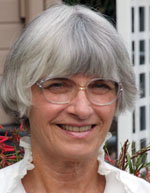 SAN DIEGO—Q1: Who created the San Diego Hall of Champions? SAN DIEGO—Q1: Who created the San Diego Hall of Champions?
Q2: What Neil Simon farce premiered at Old Globe Sept. 1988 before moving to Broadway?
Q3: What is the name of the area of Balboa Park where the House of Israel now is located?
Hint: Frank Drugan, one of the civic leaders instrumental in making San Diego's 1935-36 California-Pacific International Exposition a reality, conceived the idea of building a group of cottages representing Mexican homes of the colonial period. These were to be used as headquarters for countries participating in the exposition,
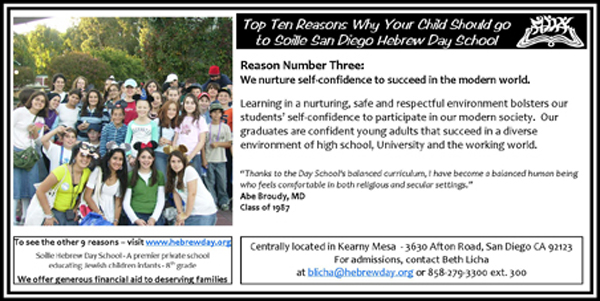
s


ADVENTURES IN SAN DIEGO JEWISH HISTORY
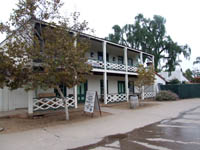
Robinson-Rose House
|
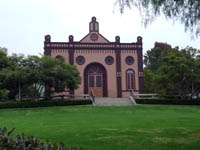
Old Temple Beth Israel |
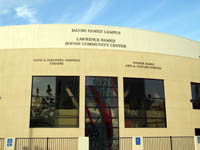
Lawrence Family JCC |
Editor's Note: We are reprinting news articles that appeared in back issues of various San Diego Jewish newspapers. You may access an index of the headlines of those articles by clicking here. You may also use the Google search program on our home page or on the headline index page to search for keywords or names.
Lasker Lodge B.B.
From Southwestern Jewish Press, July 31, 1947, page 5
At a well-attended meeting of Lasker Lodge B’nai B’rith held Monday evening, July 28th, final discussion of definite plans for the forthcoming Boatride, on Saturday evening, the no-host breakfast and luncheon at Imig Manor with a meeting between, were presented by Edward Breitbard, chairman of these events. They will occur this weekend when Lasker Lodge plays host to the Southern California Council of B’nai B’rith, which meets once a month. Dr. Bernard Lavine of Los Angeles, president of the Council will preside at the meeting. Mr.Breitbard stressed the need for making reservations for the Boatride and breakfast and suggested that members bring their wives as he Lodge’s Auxiliary officers and members will also attend. Reservations are being taken by Ed Breitbard at Franklin 3124 and by Dave Beck at Main 0194.
Morrie Kraus, chairman of Hillel Activities, reported on the recent committee meeting held at president Morrie Douglas’ house. The degree of enthusiasm for the Hillel Councilorship at San Diego State College is mounting each week, and the program is almost complete and will begin to function immediately after the opening of the Fall semester. The Hillel Committee was named in full t the meeting and they are: Chairman, Morrie Kraaus; William B. Schwartz; Edward Breitbard; Jacob Baranov; Sam Druskin; David Nelson; Morey Levenson; Dave Stotsky; and Morrie Douglas.
The meeting closed with the adoption of a resolution by Lasker Lodge to adopt a family in Europe through the national B’nai B’rith. The members expressed their desire to send food and clothing to this family and to endeavor to adopt more than one family in the near future.
Jewish War Vets
From Southwestern Jewish Press, July 31, 1947, page 5
San Diego Post 185 of the Jewish War Veterans will hold their last post meeting under the old officers on Monday August 4th at Temple Center at 8 p.m. This will be a business meeting, and the final details will be completed that night.
AT the next meeting the subject about bringing the Jewish War (Veterans) Convention to San Diego, will be discussed. If you are for this convention, and want it to be held here, be at the next meeting.
The installation of new officers, will be held Saturday, August 9th, at Temple Center. This is a public affair and all who are interested should attend. There will be no orchestra for dancing and refreshments. All veteran organizations are invited.”
Remember the date Saturday night, August 9th, at 9 p.m.
Jewish War Vets {Auxiliary}
From Southwestern Jewish Press, July 31, 1947, page 6
A business meeting will be held at the Auxiliary on August 4 at the Temple Center at 8 p.m. at which time all final plans for the coming joint installation will be discussed. All members are asked to be present at this meeting.
The following have been elected to lead the Auxiliary for the coming year. President, Jean Spatz; Sr. Vice President, Bess Avrick; Jr. Vice President, Ida Coleman; Secretary, Esther Levitt; Treasurer, Angeline Landau; Chaplain, Esther Frank; Conductress, Betty Schwartz; Patriotic Instructor, Bess Siegel; Guard, Anna Goldman; Trustee, Sylvia Adler, Pauline Rubel, and Sara Newman.
All new officers are extended many good wishes for a most successful term of office.
USO-JWB Activities
From Southwestern Jewish Press, July 31, 1947, page 6
To the sailors and marines who shed their uniforms or jeans and bathing trunks to take advantage of the summer outdoor parties sponsored by USO-Jewish Welfare Board, Sunday is the happiest day of the week.
Last week these boys, together with a group of Junior Hostesses were taken in a specially chartered bus to Del Mar. Swimming, basking in the sun and games were enjoyed. Corned beef sandwiches, cokes and iced cantaloupe satisfied their hearty appetites.
Esther Siegel, USO-JWB Director announces that these outings will be continued each Sunday throughout the summer and will be followed by dancing at the Temple Center, Sunday night. Junior Hostesses are invited to attend both of these activities as well as he informal dance on Tuesday night.

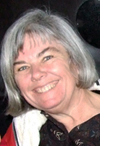 Nancy Harrison Nancy Harrison
cruise & tour specialist
(619) 265-0808

SAN DIEGO JEWISH TRIVIA ANSWERS 1) Bob Breitbard; 2) Rumors; 3) The House of Pacific Relations

SAN DIEGO JEWISH WORLD THE WEEK IN REVIEW
Middle East
Bodies of Goldwasser and Regev return to Israel in post-Lebanon II war exchange by Ira Sharkansky in Jerusalem
Israel gives Hezbollah propaganda victory by Shoshana Bryen in Washington, D.C.
Arts
Questions propel play and Jewish director by Carol Davis in Solana Beach, California
Thursdays with the songs of Hal Wingard:
—#58, Dependency
—#60, Nurse!
—#324, Dear Mr. Spine
Adventures in San Diego Jewish History
—July 31, 1947: B’nai B’rith to Present Radios to Naval Hospital
—July 31, 1947:Camp Handicraft Exhibited at Reception
—July 31, 1947: 'CARE' offices move to new location
—July 31, 1947: Initial Meeting Accomplishes Much
Middle East
Palestinians depend on Israeli economy; yet Fayyed tries to weaken its prospects by Shoshana Bryen
Australia
A Roundup of Jewish news in Australia by Garry Fabian in Melbourne
—UN's one-sidedness condemned by Prof. Bayfsky
—Year-long saga finally laid to rest
—The end of a partnership
—Federal opposition shadow minister visits Israel
—Rabbi to officiate at first lesbian ceremony
—Community pays tribute to Rabbi Groner
—Charges imminent against Adelaide rabbi and wife
—Businessman launches Orthodox newspaper
—Kadimah Marks 10 Years
—It's Never too late to celebrate your Barmitzvah
—Another Jewish Boy hits the Big League
—By weight, rabbi warns of hazards of a kosher diet
Arts
Real life with 'Phantom' star Marni Raab by Carol Davis in San Diego
Sports
Watching All-Star game with friend Fox by Donald H. Harrison
Adventures in San Diego Jewish History
—July 24, 1947: JCRA
—July 31, 1947: Flash! {Camp Palomar}
—July 31, 1947: World Affairs Institute Here August 4th to 8th
—July 31, 1947: UJF Quota More Than Half Collected
)
Middle East
San Diego's UJF Mission arrives in Sha'ar Hanegev; where else to go for Latin food? by Ulla Hadar in Kibbutz Or Haner
Sarkozy sacrifices Franch honor to Syria by Shoshana Bryen in Washington, D.C.
Canada
Involving neo-Nazi youths in research led to turnaround in their attitudes by Rabbi Dow Marmur in Toronto
Arts
Jewish love for those great sailing ships by Donald H. Harrison in San Diego
Letters
When a community works in concert from David Amos in San Diego
G.I. Joe and biblical translation from Dan Schaffer in San Diego
Our growing arts and culture district from Alan Ziter in San Diego
Adventures in San Diego Jewish History
—July 24, 1947: Birdie Stodel B.B.
—July 24, 1947: Yo-Ma-Co
—July 24, 1947: Pioneer Women
—July 24, 1947: Temple Sisterhood Project Off To Fine Start
Middle East
Israel's national guessing game: Can Olmert last? If not, who will succeed him? by Ira Sharkansy in Jerusalem
Sha'ar Hanegev bureau chief campaigns to dispose of litter at Kibbutz Ruhama by Ulla Hadar in Kibbutz Ruhama, Israel
Letters
Seeks memoirs from North Americans who volunteered during Israel's Six-Day War from Michael Zimmerman in Chicago
Yesawich, Rhodes make aliyah from San Diego from Dena Wimpfheimer in New York City
Article on Merchant Marine wins plaudits from Cantor Sheldon Merel in San Diego
Adventures in San Diego Jewish History
—July 24, 1947: Week At Camp In Palomar Mountain
—July 24, 1947: Day Camp Proves Successful in S.D.
—July 24, 1947: USO-JWB Enjoys ‘Brunch’
—July 24, 1947: Lasker Lodge B.B.
Arts
TICO concert brings community together by Donald H. Harrison in San Diego
Jean Isaacs: Generous spirit opens doors by Sheila Orysiek in San Diego
Middle East
Iran's bad week: gas deal with French Total sours, missile test lacks credibility by Shoshana Bryen in Washington, D.C.
Shaliach tells fellow kibbutzniks about his goodwill assignment in Tulsa, Oklahoma by Ulla Hadar in Kibbutz Ruhama, Israel
G. I. Joe’s choices reshape the battlefield by Sheila Orysiek in San Diego
San Diego and the Nation
World War II-era Merchant Mariners seek compensation for lost G.I. Bill privileges by Donald H. Harrison in San Diego
Adventures in San Diego Jewish History
—July 17, 1947: Lasker Lodge B.B.
—July 17, 1947: Jewish Labor Com.
—July 17, 1947: Birdie Stodel B.B.
—July 17, 1947: Pioneer Women
Judaism
The wily machinations of the yetzer hara by Rabbi Baruch Lederman in San Diego
Sports
A bissel sports trivia with Bruce Lowitt in Clearwater, Florida
Judaism
We can judge a leader by his followers by Rabbi Leonard Rosenthal in San Diego
San Diego
Danny and Clyde... They lived a lot, and stayed friends since their school days by Donald H. Harrison in San Diego
Adventures in San Diego Jewish History
—July 10, 1947: J.C.R.A
—July 10, 1947: Birdie Stodel B.B.
—July 10, 1947: U.S.O.-J.W.B. Activities
—July 17, 1947: Palomar Camp Plans Completed
Arts
Falstaff a great fall guy in 'Merry Wives' by Carol Davis in San Diego
Famed director Sydney Pollack laughingly agreed to take direction from an amateur by George Falkowitz in Oceanside, California
Chapter 16 of Reluctant Martyr, a serialized novel by Sheila Orysiek in San Diego
Link to previous editions
< BACK TO TOP
|
|

